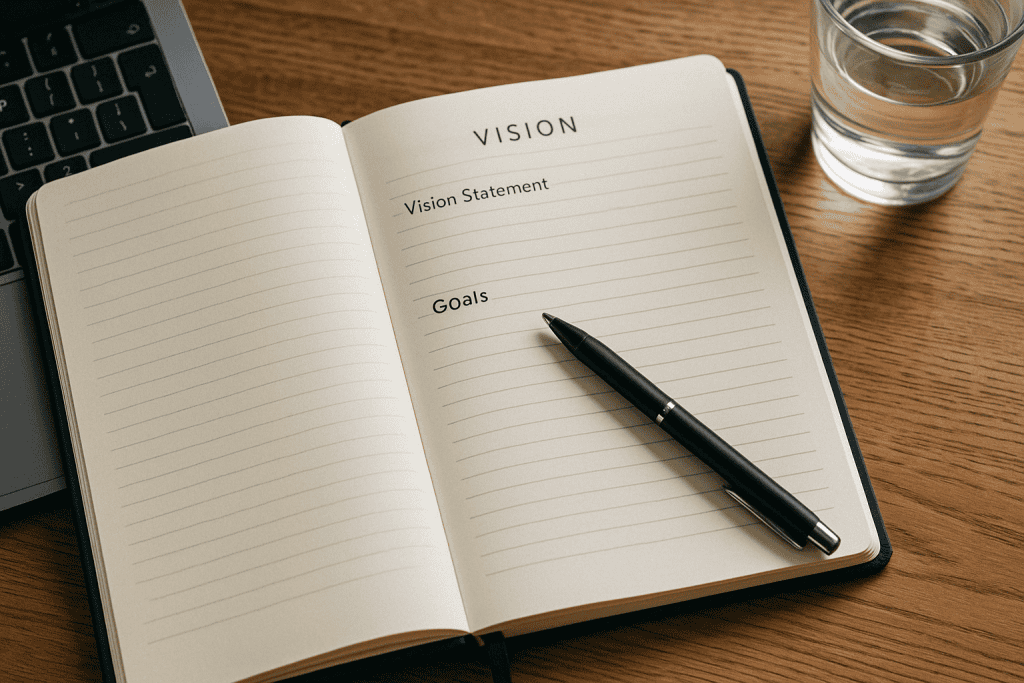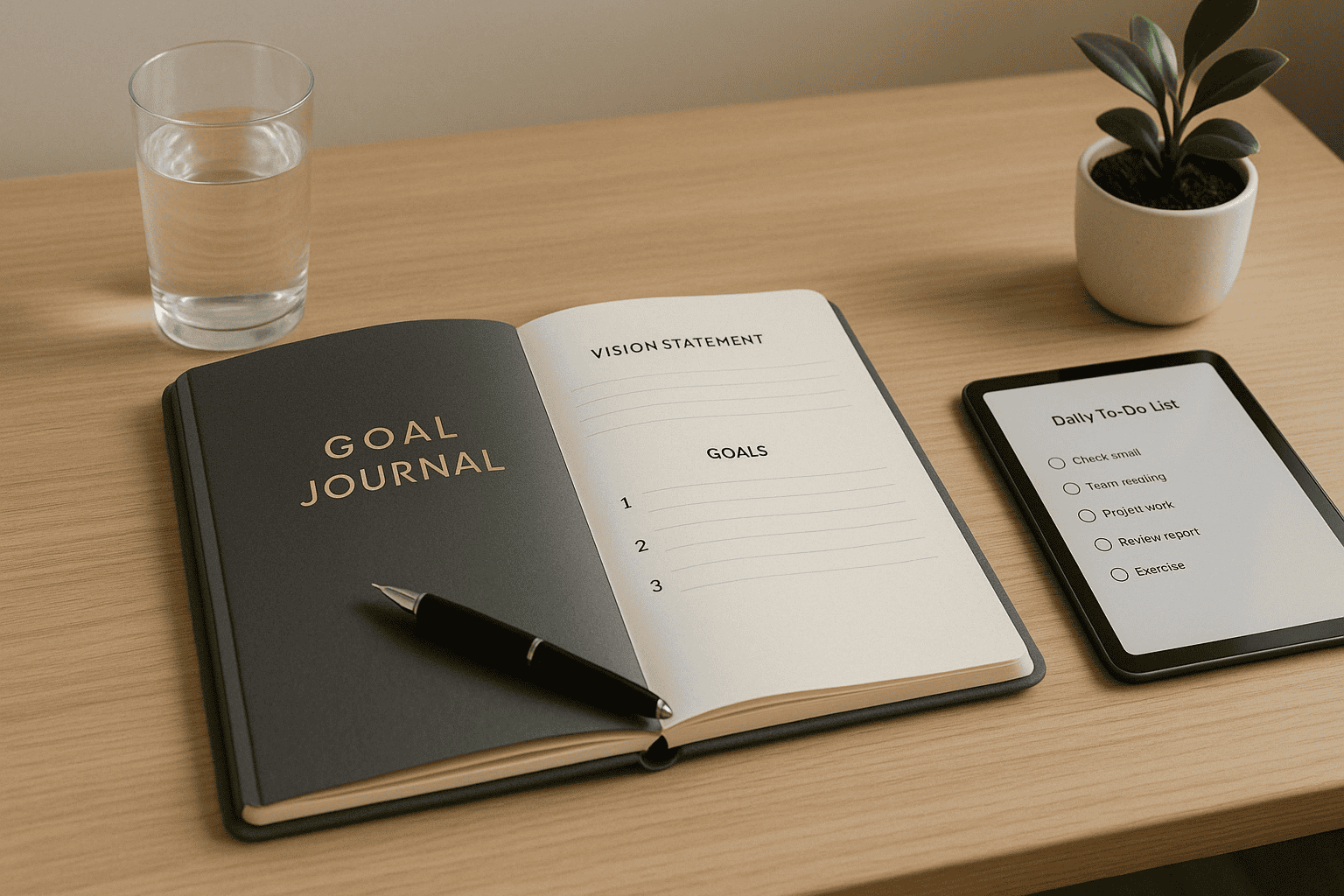Master Goal Journaling: Enhance Productivity and Achieve Success with Proven Techniques
Introduction
A goal setting journal is a powerful tool designed to assist individuals in setting, tracking, and achieving their personal and professional objectives. More than just a diary, a goal setting journal helps with organizing thoughts and maintaining focus on what’s truly important.
By integrating goal journaling into your daily routine, you can cultivate a habit that fosters personal growth, enhances productivity, and ultimately leads to success.
Table of Contents
The information on this site is free. However, we partner with companies that offer products that help our readers achieve their goals. This site contains affiliate links, and we may get commissions for purchases made through links and ads to support this site at no additional cost to you. Please read my disclosure for more information.

Understanding Goal Journals
A goal journal specifically focuses on the documentation and progression of your aspirations. Unlike traditional journals that recount daily events or emotions, goal planners and journals are structured to emphasize setting, tracking, and evaluating goals.
This type of journaling encourages a proactive mindset, differentiating itself with a clear purpose: to transform ideas and ambitions into tangible achievements. These tools help you identify your priorities and actionable steps, ensuring that you stay aligned with your objectives.
Benefits of Keeping a Goal Journal
One of the key benefits of maintaining a goal journal is the improved focus and clarity it brings to your objectives. By consistently writing down and refining your goals, you sharpen your understanding of what you want to achieve.
Moreover, a goal journal serves as an evolving record of progress, offering motivation as you track progress and witness your own advancement. It also provides a platform to reflect on both accomplishments and lessons learned, ensuring that you grow with each entry. By reflecting on both accomplishments and lessons learned, you ensure that you are not only setting goals but also accomplishing them effectively.
Setting Up Your Goal Journal
Selecting the right type of journal is crucial; many people prefer a dedicated paper journal for its tactile experience while others opt for digital journals for easy access and organization.
Essential elements of a goal journal include a clear vision statement, detailed goals, a schedule, and a plan of action. Customizing the layout to fit your personal style and needs can significantly enhance the journaling experience, making it more engaging and effective.
Choose a journal with high-quality pages that provide enough space for writing down your thoughts and plans.
Choosing the Right Planner
Choosing the right planner is a crucial step in achieving your goals. With so many options available, it can be overwhelming to decide which one is best for you.
When selecting a planner, consider your personal goals, daily tasks, and quarterly goals. Look for a planner that provides enough space to write down your thoughts, ideas, and to-do lists.
A good planner should help you stay organized, focused, and motivated. Consider a planner that includes features such as goal setting templates, habit trackers, and daily progress tracking. Some popular options include the Panda Planner, bullet journal, and goal setting journals. Remember, the best planner is one that aligns with your needs and helps you achieve your goals.
Effective Journaling Techniques for Goal Setting

To fully harness the power of goal journaling, employ effective techniques such as setting S.M.A.R.T. goals—Specific, Measurable, Achievable, Relevant, and Time-bound goals that are clearly defined and easily tracked.
Visualization and positive affirmations can further enhance your commitment, while breaking down big goals into actionable steps with set timelines ensures steady progress. This methodical approach keeps your journey structured and manageable. By breaking larger goals into smaller, manageable tasks, you can maintain momentum and avoid feeling overwhelmed.
Creating a Journaling Routine
Creating a journaling routine can help you stay consistent and motivated in achieving your goals. Start by setting aside a specific time each day or week to journal.
Choose a quiet and comfortable space where you can reflect on your progress and write down your thoughts. Begin by writing down your goals, breaking them down into manageable steps, and tracking your daily progress.
Use prompts or questions to guide your journaling, such as “What are my priorities for the week?” or “What small wins can I celebrate today?” Consistency is key, so try to journal at the same time every day or week.
You can also use technology to enhance your journaling routine, such as using a journaling app or setting reminders to journal.
Maintaining Motivation and Consistency
Establishing a consistent journaling routine is vital for ongoing motivation and success. By setting aside a regular time for entries, it becomes a habit rather than a chore.
Inspiration can be drawn from prompts and questions that encourage reflection, assessment, and forward planning. To avoid stagnation, it’s important to address obstacles to consistent journaling such as lack of time or motivation, turning potential roadblocks into opportunities for growth.
To avoid stagnation, it’s important to make adjustments based on your progress and insights gained during regular check-ins.
Reflecting and Adapting Goals

Regular reviews of your journal entries offer invaluable insights for self-assessment and reflection, helping you shape a fulfilling future. This practice not only tracks progress but allows for the adjustment of goals as needed, shaping them to align with current priorities or circumstances.
Celebrating milestones, no matter how small, reinforces commitment and keeps the journey toward achieving larger goals engaging and rewarding. By reflecting on your progress, you gain better control over your goals and can make necessary adjustments to stay on track.
Tools and Resources for Goal Journaling
Numerous apps and digital tools can facilitate your goal journaling journey by offering easy and organized tracking of your progress.
Some planners are scientifically designed to enhance productivity and happiness, making them highly effective tools for goal achievement. For beginners, templates and printable resources provide a structured approach to starting a goal journal.
Engaging with a community of goal journal enthusiasts can offer support, inspiration, and shared tips, making the practice more enjoyable and effective. Research has shown that writing down goals can significantly enhance success rates, underlining the importance of using structured tools for goal setting.
Using Technology to Enhance Journaling
Technology can be a powerful tool in enhancing your journaling routine. There are many apps and digital tools available that can help you stay organized, focused, and motivated.
Consider using a digital planner or journaling app that allows you to track your progress, set reminders, and access your journal from anywhere. You can also use digital tools to create a vision board, set goals, and track your habits.
Some popular options include digital goal setting planners, habit tracking apps, and mindfulness tools. Remember, technology should enhance your journaling routine, not replace it. Use it to supplement your journaling practice and stay consistent.
Creating a Support System
Creating a support system is crucial in achieving your goals. Surround yourself with people who support and encourage you, such as friends, family, or a mentor.
Share your goals and progress with them, and ask for their feedback and guidance. You can also join a community or group of like-minded individuals who share similar goals and interests. This can provide a sense of accountability, motivation, and support.
Consider finding an accountability partner or joining a mastermind group to help you stay focused and motivated. Remember, achieving goals is not a solo journey, and having a support system can make all the difference.
By creating a support system, you can stay motivated, overcome obstacles, and achieve your goals.
Conclusion
Goal journaling is a transformative practice with the potential to significantly improve your personal and professional life through structured goal achievement.
By dedicating time to this focused documentation, you lay the foundation for achieving success through thoughtful planning and consistent effort.
Whether you’re just starting or looking to enhance your existing practice, goal journaling can guide you toward realizing your full potential.
Additional Resources
- Locke, E. A., & Latham, G. P. (2002). Building a practically useful theory of goal setting and task motivation. American Psychologist, 57(9), 705–717.
https://psycnet.apa.org/doi/10.1037/0003-066X.57.9.705 - Psychology Today. (n.d.). Goal setting. Psychology Today. https://www.psychologytoday.com/us/basics/goal-setting
- MindTools. (n.d.). Personal goal setting: Planning to live your life your way. MindTools. https://www.mindtools.com/a4wo118/personal-goal-setting
- PositivePsychology.com. (2021). 22 Goal Setting Tools, Worksheets, and Templates for 2024. https://positivepsychology.com/goal-setting-tools/











